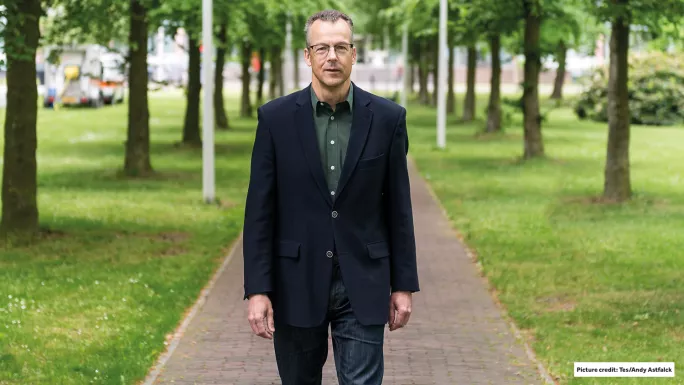- Home
- Bullying stems from the pursuit of status
Bullying stems from the pursuit of status

The world of adults is sometimes very similar to the playground,” muses Toon Cillessen, professor of developmental psychology and director of research at the Behavioural Science Institute at Radboud University in the Netherlands. “Relationships among adults and among kids in school are not really all that different.”
For teachers used to sorting out messy teenage relationships, this may be taken as an insult. But Cillessen speaks from a position of authority: he’s one of the leading researchers into the interactions between young people, having spent 30 years peering into the juvenile world and then reporting his findings in books, studies and through presentations across the globe. He insists that squabbling over status among young people - which can often be dismissed by teachers as “immaturity” - is also a trope of adult relationships.
“I’m very interested in people’s status in a group - who’s popular, who’s liked, who’s excluded and why that happens in human groups generally and classrooms specifically,” he explains. “Relationships in school are like the early form of what we do later on in life, so it’s a fascinating topic to study.”
If you look hard enough, it is not particularly difficult to see that staffrooms - and teacher discussions on social media, particularly on Twitter - may showcase behaviours that are the natural evolution of Hunger Games-style playground battles for popularity. But despite experiencing the highs and lows of these social skirmishes themselves, Cillessen believes that teachers can underestimate the impact of these same relationship wrangles on young people.
“How people do socially has a large impact on how they do in other areas of their lives,” he explains. “So in school there’s a relationship between how you do socially and how you do academically. If you’re bullied, you don’t learn particularly well.
“Increasingly, research is also showing that if people have poor relationships, they suffer in terms of health consequences. It’s obvious that mechanisms like stress play a role in that.
“So understanding the social world of children is interesting in and of itself, but also because it’s so strongly connected to school functioning, health and long-term development. That makes it important.”

It’s perhaps most important, he says, because understanding student relationships is the key to understanding one of the most difficult issues that schools deal with: bullying.
“With friends, you learn all kinds of things you use later in life - how to trust somebody, how to collaborate, how to cooperate, how to be helpful,” he says. “However, the peer group is also a socialising agent for negative outcomes. From friends, kids also learn how to bully, for example.”
Bullying, Cillessen explains, is used as a tool to maintain status - something that can become extremely important in teenage years.
“Status is important to everybody,” he says. “I think in terms of human motivation, there are two basic things people want - positive relationships and to be respected and seen as valuable and worthwhile. For adolescents, this is particularly important. I think that has a lot to do with puberty and sexual maturation. That plays a big role in them wanting to be attractive and interesting to other people.
“Also, in adolescence there’s a strong need to become autonomous and independent - and status plays a role in that as well.”
Interestingly, while you might think bullying would make someone unpopular and reduce their status, Cillessen says that is not the case. He notes that being liked and being popular are distinct: “Think back to your time in high school to the kids who were really popular, and ask yourself the question - did you like all of them? No.”
Popularity and prejudice
Being liked is associated with being helpful, kind to others, understanding others and not being aggressive, he explains. By contrast, popularity is associated with both pro-social and anti-social behaviour.
“The characteristics that define popularity are being dominant, influential, visible and ‘on top’ - and that is linked to aggressive behaviour,” he reveals. “Kids who aspire to be popular engage more in manipulative behaviours to try to achieve or maintain status.
“So you’ll see bullying is very high among kids who are both popular and want to be popular, because it’s a way to establish your position in the peer group and control other people so they want to be with you.
“If you’re a bully, some people are afraid of you and others want to be your friend, because they want to be like you or be in your group.”
Gaining status is why bullying proves such a tough issue for schools, he says.
“Bullying is difficult to change in schools because there is so much reward associated with it in terms of having a high status,” he says. “Kids will try to impress others or be liked by particular people, and I think that’s fine. But when it crosses the line to involve bullying, or putting down other people to look better yourself, I think that’s where teachers will want to intervene.”
Cillessen says research can help here. “We’ve experimented with simple strategies teachers can use to create a collaborative, respectful atmosphere in the classroom, where there’s more a sense of equality and status is less important,” he reveals.
“One thing to look at is where you sit kids. If you can move kids who don’t like each other closer together in the classroom, they have to learn to get to know the other person, they have to work together, and that can have a positive impact on their relationship. By working with that person, they realise ‘this person isn’t all bad’. That will make them less likely to aggress against them.
“So by regularly changing seating arrangements, teachers can have a positive impact.”
Another way teachers can have a powerful effect is by modelling appropriate behaviour, he suggests. “The teacher is a social reference. They set the norm. So if a teacher puts down a kid in front of the class, that’s a very clear signal to the rest of the group that it’s OK to put that kid down,” he notes.
“One thing we’ve looked at is an intervention where teachers change the ratio of positive-to-negative feedback they give. We encourage the teacher to give more positive feedback to a student in front of everybody else.”
He recognises this is complex, as you still need to reprimand - and perhaps you’ll feel a particularly aggressive child could do with being brought down a peg or two. “You may want to take into account who the kids are,” he agrees. “You want to create an atmosphere where everybody is equal. But if a kid really is a popular bully, you may want to be more direct in stopping that behaviour.”
What’s fascinating is that children’s social status is generally unwavering: “Who is popular and who is a bully is particularly stable from one year to the next,” notes Cillessen. What’s also fairly predictable is that kids who are popular and aggressive at a young age tend to follow a trajectory to bullying when they’re older. Staffroom bullies probably had the same role in the playground as a student.”
But he thinks teachers are under too much pressure to “solve” bullying. “I don’t think it can be expected of teachers to prevent all bullying. If teachers can intervene when kids are young, whether they can completely prevent the trajectory is very difficult to say because there may be other factors playing a part. But I do think teachers can help by trying to create a positive atmosphere in the classroom and preventing bullying there.”
They can also help by not labelling everything as bullying, he says, For Cillessen, it’s important that the distinction between bullying and falling out among friends is recognised, so the latter situation is left to resolve without intervention and become a crucial learning point for children.
“There is more conflict between friends than non-friends because part of a relationship is that you’re going to disagree with the other person.
“That’s why friendships are so important: because they are training grounds for learning the social strategies you need as an adult. The challenge is, how can you disagree with somebody and still have a positive relationship with them?” he says.
“If you want to maintain the friendship, you’re going to have to figure out a way to give and take. And that’s eventually what all friendships require in life. So friendships among children are very important preparation for healthy adult relationships.”
Rather than direct intervention to facilitate this, he says it is again about what teachers do in the classroom: “If teachers have a discussion about a controversial topic, for example, they can show students how you can respectfully disagree with others.”
Cillessen’s last nugget of advice is that some friendships will end, which is just as crucial a part of learning about relationships. He says it is important teachers accept that, rather than forcing the issue.
“Most people have long-lasting friendships, and that’s important. But do all your friendships have to be like that? No. I don’t think it’s the teacher’s job to try to force friendships to continue.
“I would really worry about a student who seems to have no friends at all. But beyond that, the natural course of friendships is that sometimes they come and go - sometimes very quickly. You can’t expect everybody to be friends with everybody else. That’s OK.”
Jessica Powell is a freelance writer. She tweets @jpjourno
Keep reading for just £1 per month
You've reached your limit of free articles this month. Subscribe for £1 per month for three months and get:
- Unlimited access to all Tes magazine content
- Exclusive subscriber-only stories
- Award-winning email newsletters



